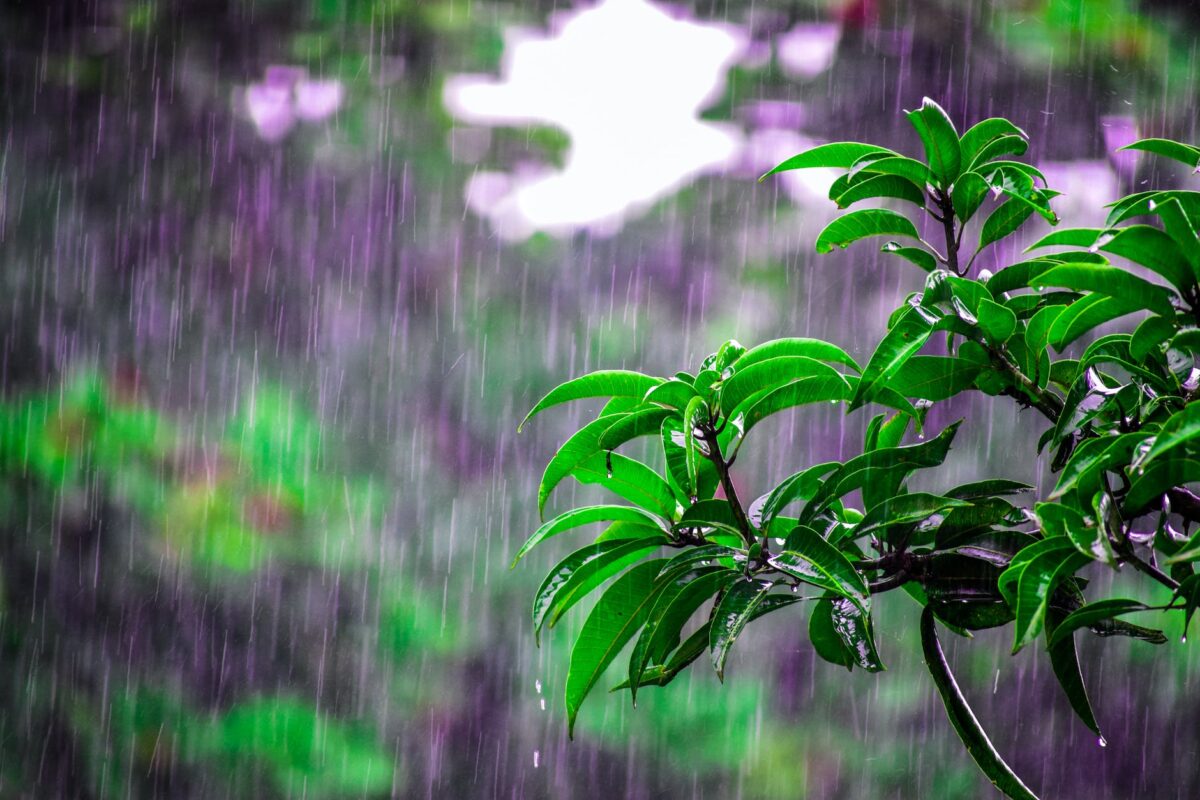I was recently writing something about topic-marking particles (은/는) and subject-marking particles (이/가), and I suddenly started wondering why we almost always use -이/가 with rain and snow. When it’s raining, why do we say, “비가 와요” and not “비는 와요”? When it’s snowing, why does “눈이 와요” sound natural but “눈은 와요” sounds weird? I thought about this a lot and came up with some possibly wacky personal speculation. (I do this a lot, the wacky speculation thing. I’m insatiably curious!)
I think maybe this is because our conversational focus is really unlikely to be the rain or snow itself. The topic marker -은/는 generally serves a couple of primary purposes: (1) setting the topic of conversation or (2) showing comparison or contrast. When we start talking about a rainy day, it might seem like we should say, “비는 와요,” because we’re talking about rain, right? Isn’t rain our topic?
But once I thought about it, I realized that people don’t tend to really focus on talking about the rain as a phenomenon—instead, they’re probably focusing on the fact that the ground will be wet, the picnic will be canceled, they like the sound against the windows, driving will be dangerous, or whatever. When you’re talking about rain, you’re usually talking about the effect it’s having on you or the world, not starting a conversation about the actual concept or physical characteristics of rain. So rain isn’t your actual topic … it’s just the cause of events.
A lot of teachers suggest thinking of the topic marker as implying “as for…” (like “저는 피자를 좋아해요” meaning “As for me, I like pizza”), but if we did this with my rain example, we would have “비는 와요” meaning something like “As for the rain, it comes,” which implies a kind of focus on the rain that doesn’t sound at all natural. Like we’re comparing the rain to other things that haven’t come, or something. Sounds funky to me.
Also, when we say “비가 와요,” the rain is usually new information which we haven’t mentioned in previous sentences, and new information usually merits the subject marker -이/가. Maybe if we were afterward going to continue to talk about the characteristics of the rain itself (rather than the environment in which the rain is falling or the effect the rain is having), then we might use the topic marker, but I haven’t seen it often with reference to weather.
I got curious and looked at the lyrics for BTS’s song “Rain,” because I figured an entire song about rain might have some examples of the topic marker -는 being used with 비, and I think the song’s lyrics contain some useful examples of nuances that the topic marker can bring. In most places in the song, 비 takes the subject marker -가 or takes no marker at all. But here are a couple of examples of lines where 비 takes the topic marker -는:
- 숙소 밖 여전히 비는 내리네 (It’s still raining outside the dorm)
- 이 비는 누굴 위해서 내리는 걸까? (Who is this rain falling for?)
In the first line—“숙소 밖 여전히 비는 내리네”—I personally think the topic marker gives a feeling that this is familiar rain, the same rain that has been falling outside the dorm since BTS were trainees, almost as if it has been continuous during all of those years, maybe is even composed of the same raindrops. I’m far from fluent, but it just gives me that sort of feeling. If it were written with the subject marker -가 instead (“숙소 밖 여전히 비가 내리네”), I think there would be less of a sense of it being the same rain. It would be less poetic and more just … yeah … it’s always raining outside the dorm. Big deal.
In the second line I listed above—“이 비는 누굴 위해서 내리는 걸까?”—I think the topic marker is being used to differentiate this specific rain from other rain. THIS rain … this SPECIFIC rain, as compared to other rain I’ve experienced … who is THIS rain falling for? I think if it were written with the subject marker -가 (“이 비가 누굴 위해서 내리는 걸까?”) it wouldn’t really make much sense. With the adjective 이 (“this”), we’re implying that we’re talking about some specific rain, which implies differentiating it from other rain, and we use the topic marker for these kinds of contrast.
That last thought made me curious to investigate whether nouns following 이, 그, and 저 more often take the topic marker rather than the subject marker, but perhaps that is an investigation for another day, since I’ve already ventured pretty far afield in my speculations for today.
I also have a longer blog entry that’s more generally about topic- and subject-marking particles, but that, too, will wait for another day!
As I’ve said, I’m not a native speaker. This is really just me letting my brain run free to try to imagine why the language works the way it does, so I would be happy to hear other thoughts about this!
–
Side note: The lyrics I quoted above use the verb 내리다 (to fall, drop, descend, etc.) instead of 오다 to describe rain. I think this, too, is to create a more poetic feel. In use, I’ve most often seen 내리다 used to describe a person’s act of disembarking from a mode of transportation (getting out of a car, getting off a bicycle, getting off a train, etc.), and people usually use 오다 to talk casually about falling rain and snow. But it’s good to remember that other verbs can be used, too!


Here for the musings!!! 🥰